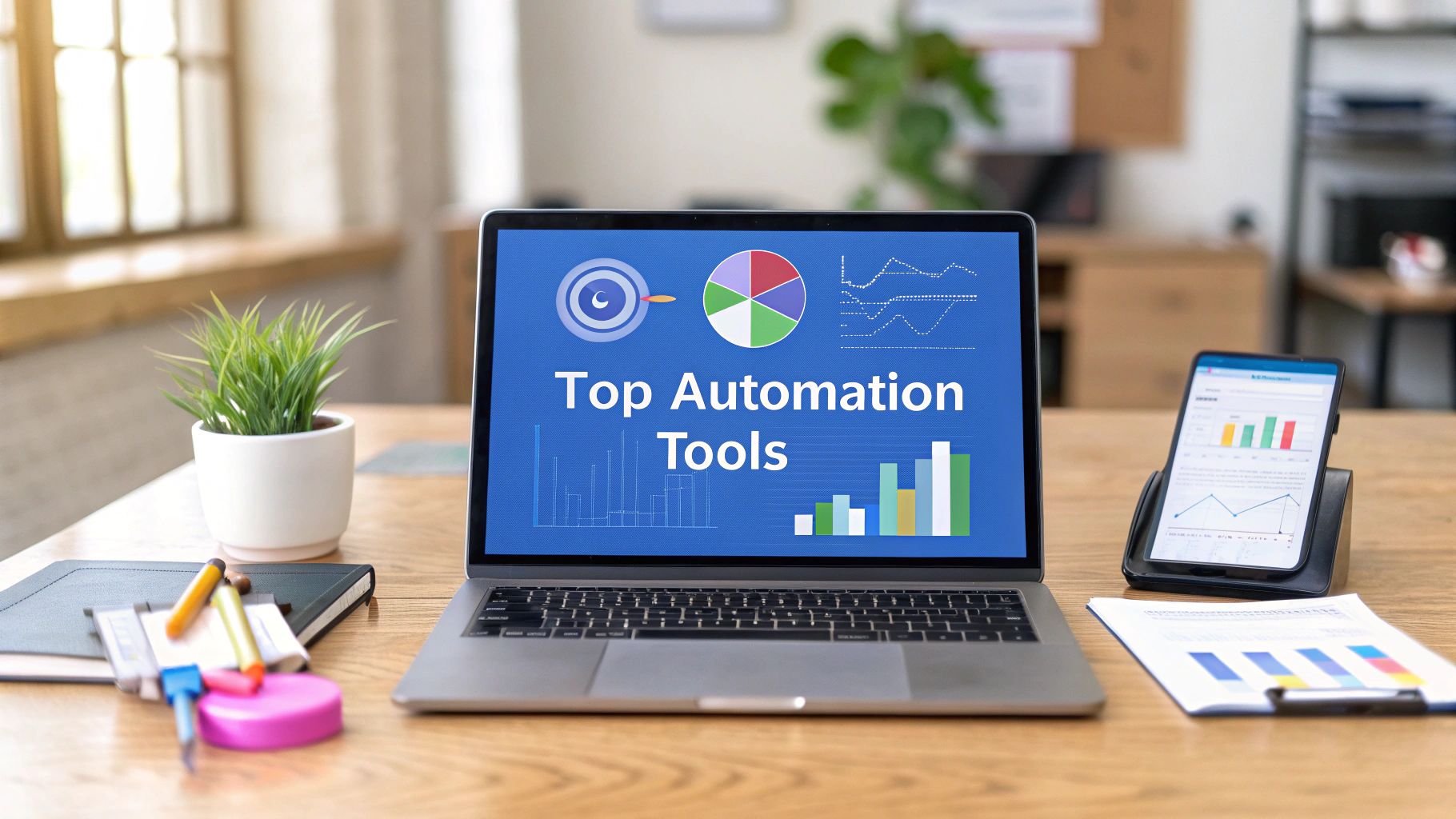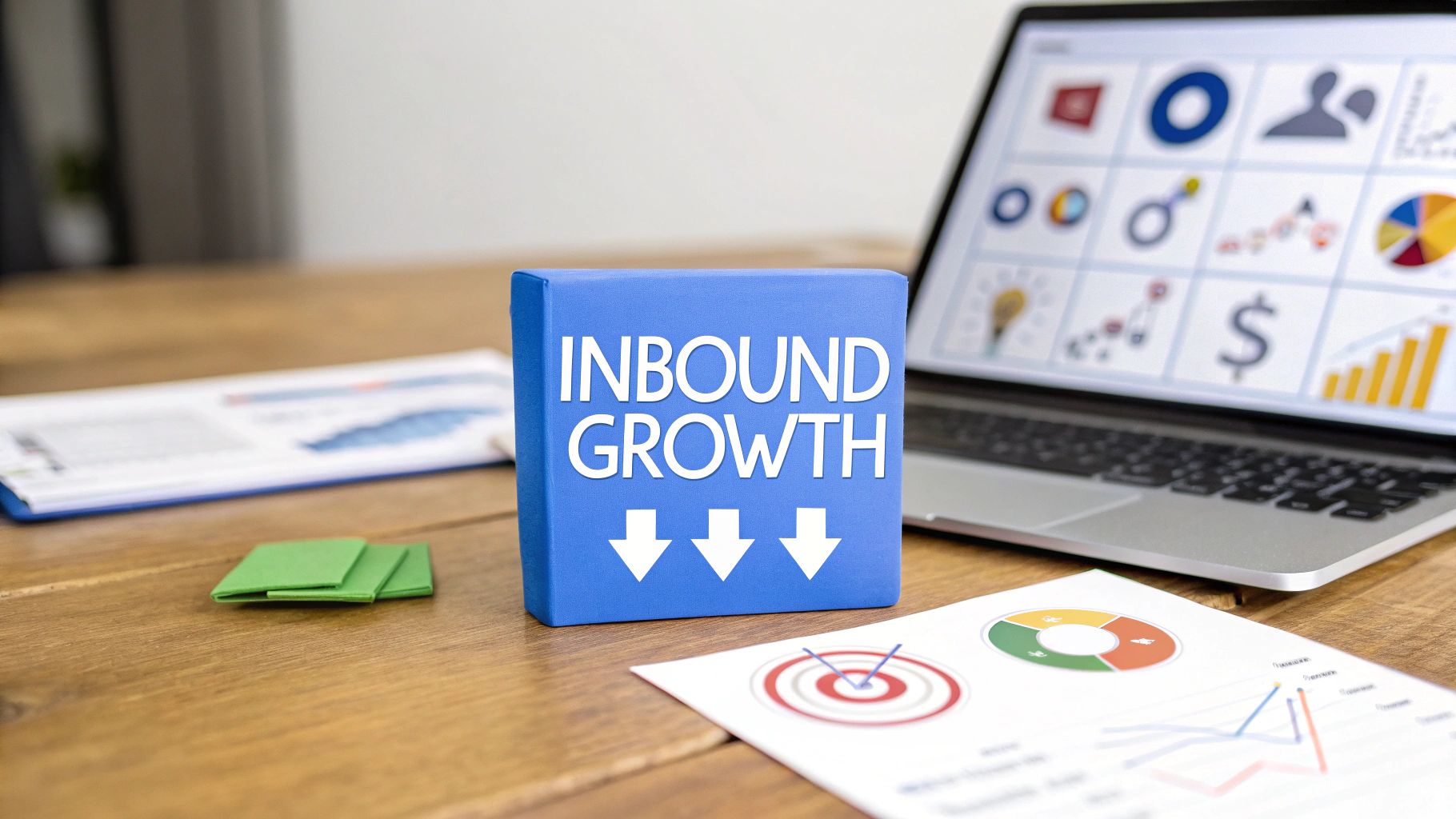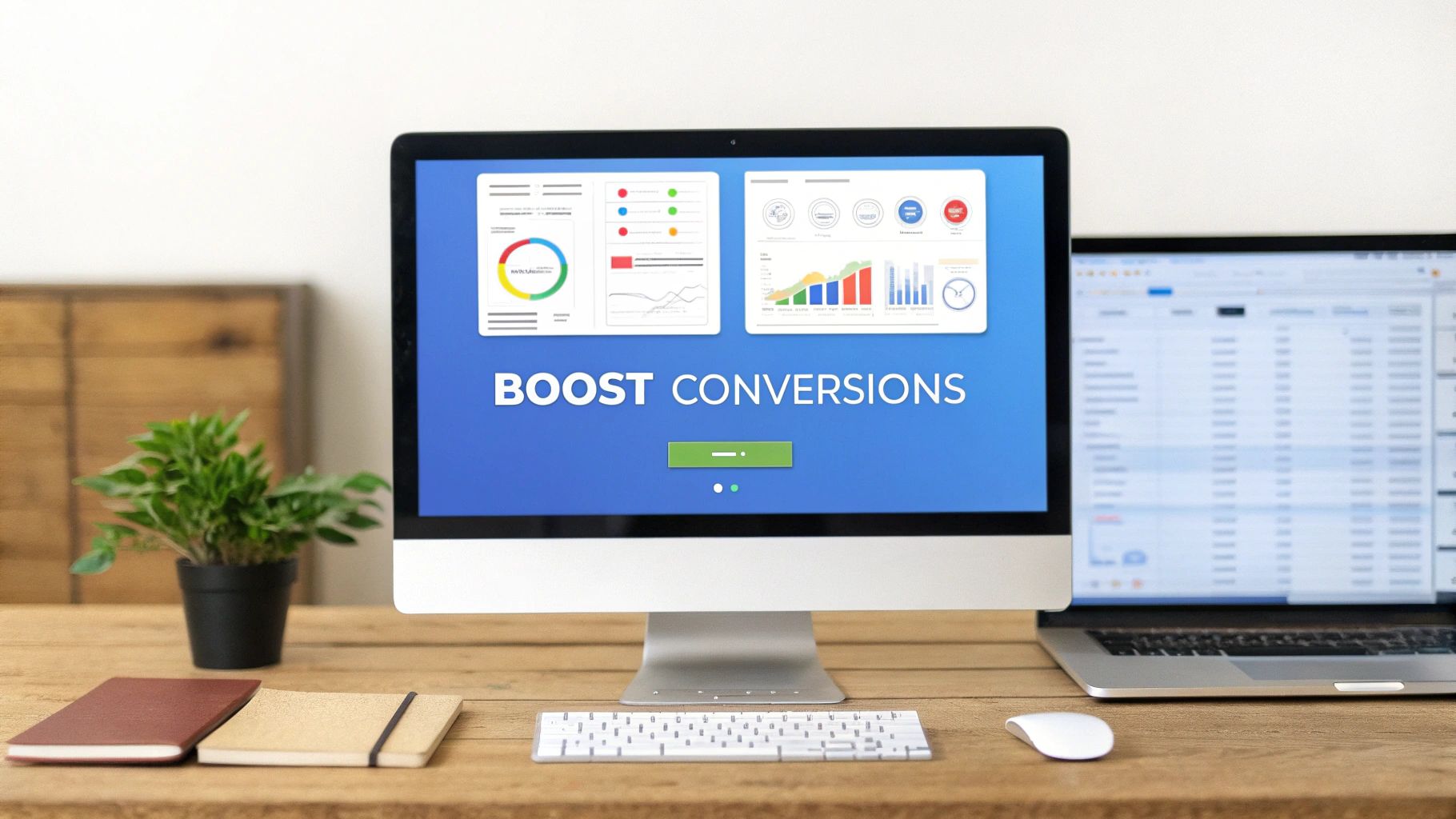Summary
Meta Description: Discover the best marketing automation software for 2025. Our in-depth review compares HubSpot, Salesforce, Klaviyo, and more to help you choose the right tool.
Are your manual marketing tasks holding back your growth? Effective marketing automation is more than just scheduling emails. It's about building personalized, scalable customer journeys that save time and directly fuel revenue. The right platform can turn repetitive tasks into a sophisticated engine that nurtures leads, engages customers, and delivers crystal-clear ROI data. But with so many options, how do you find the best marketing automation software for your business?
This guide cuts through the marketing fluff. We provide an in-depth, honest comparison of the top platforms available today, from enterprise powerhouses like HubSpot and Salesforce to specialized tools like Klaviyo and ActiveCampaign. We move beyond generic feature lists to focus on what truly matters: real-world use cases, practical limitations, and crucial implementation details.
Inside this comprehensive review, you'll find:
- Detailed breakdowns of each platform's core strengths and weaknesses.
- Honest pros and cons based on actual user experiences.
- Ideal use cases to help you match a tool to your industry (B2B, e-commerce, SaaS, etc.).
- Screenshots and direct links to see the software in action.
Our goal is to arm you with the information needed to make a confident, strategic decision. While this article focuses on automation, you might also want to explore a broader range of marketing software to ensure all your strategic needs are covered. Let's find the perfect tool to scale your marketing efforts. Ready?
1. What are the best marketing automation tools for all-in-one platforms?
For businesses seeking a single, unified solution, these platforms offer comprehensive features that cover the entire customer lifecycle.
HubSpot Marketing Hub: The All-in-One Powerhouse
HubSpot Marketing Hub earns its top spot by offering a deeply integrated, all-in-one platform that combines a powerful CRM with a full suite of marketing automation tools. This integration is its key differentiator, eliminating the common headaches of syncing data between separate applications. For businesses looking for a single source of truth, HubSpot provides a seamless solution. Its user-friendly interface makes it accessible for beginners, yet its feature depth satisfies complex enterprise needs.
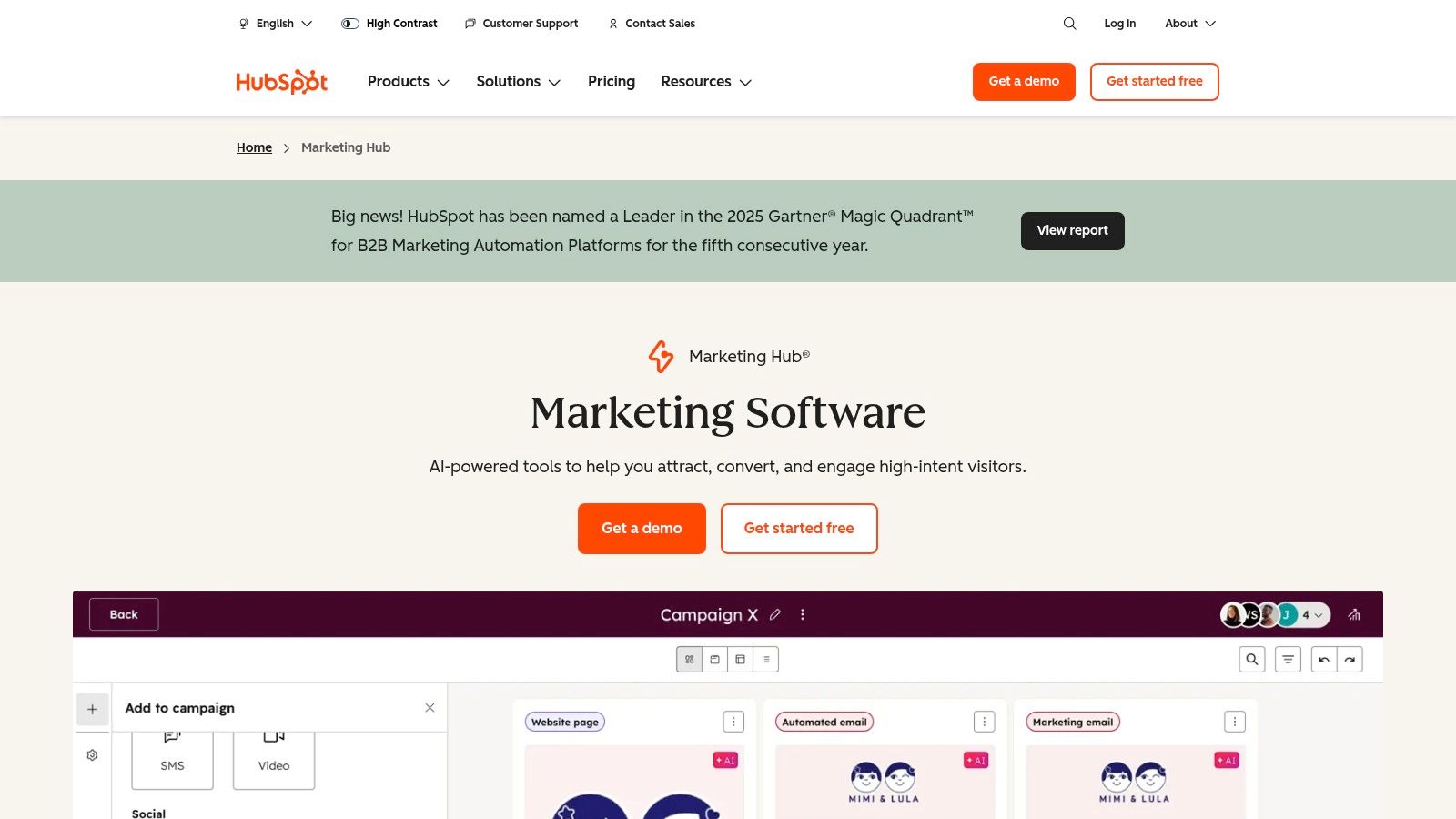
This platform excels at creating sophisticated customer journeys using a visual workflow builder. You can trigger automated emails based on website behavior, update contact properties, or create internal tasks for your sales team. Beyond email, HubSpot consolidates tools for landing page creation, ad management, social media scheduling, and detailed reporting. This makes it one of the best marketing automation software choices for teams wanting to manage their entire funnel from a single dashboard.
Key Features & Considerations
- Integrated CRM: All marketing activities are tied directly to contact, company, and deal records, providing a 360-degree customer view.
- Visual Automation: The intuitive drag-and-drop editor simplifies building complex, multi-branch automation sequences.
- Pricing & Scalability: Plans scale from a free tier to robust Enterprise solutions. However, costs rise significantly based on marketing contact counts.
- Onboarding: Be prepared for a mandatory, paid onboarding process for Professional and Enterprise tiers, which ensures proper setup but adds to the initial investment.
Website: https://www.hubspot.com/products/marketing
Brevo (formerly Sendinblue): The All-in-One for SMB Budgets
Brevo carves out its space by offering a comprehensive suite of marketing and sales tools at a highly competitive price point. Previously known as Sendinblue, its primary appeal lies in its volume-based pricing model. This approach is highly attractive for small businesses (SMBs) and startups growing their contact list but maintaining a modest sending frequency.
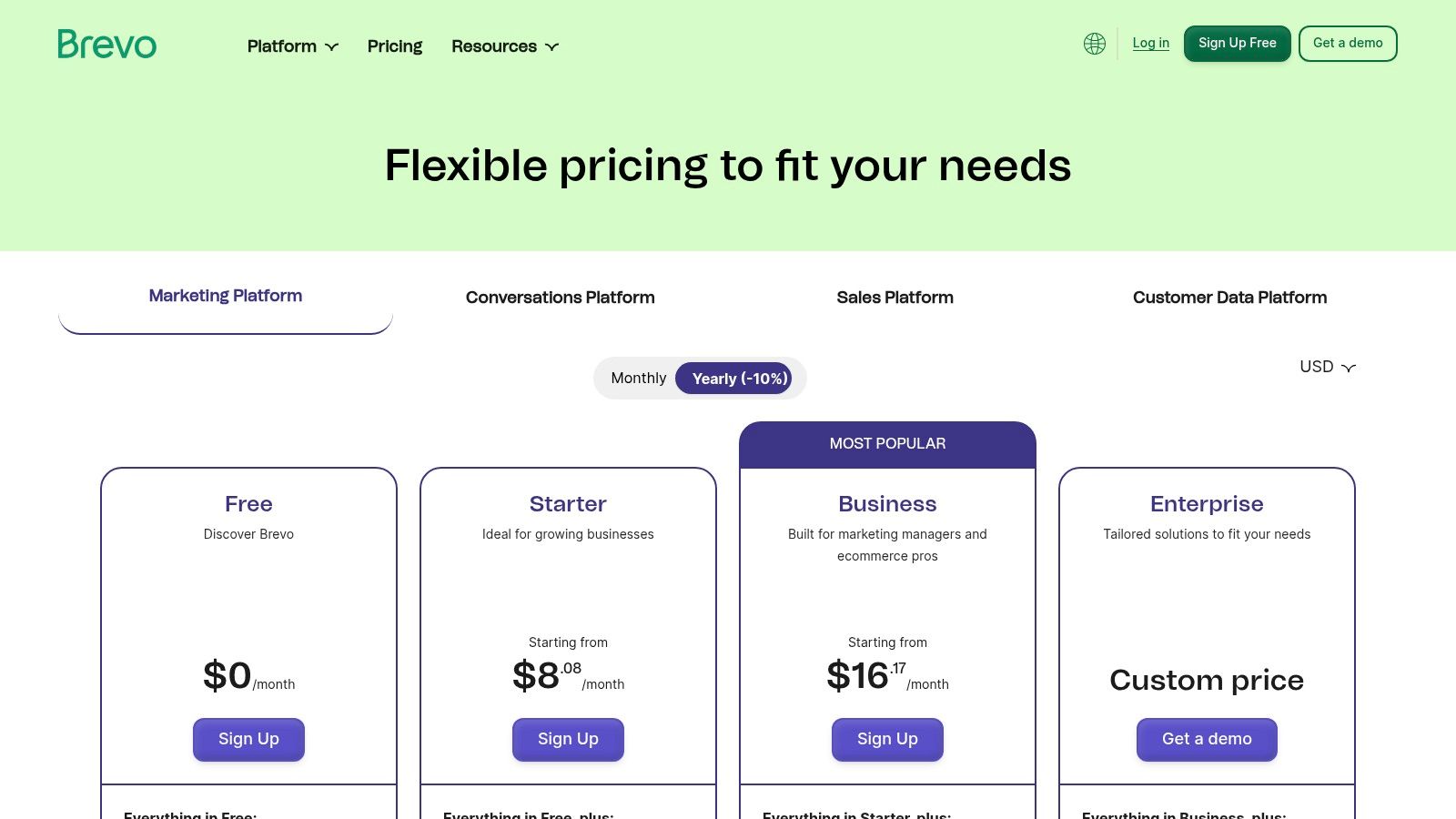
The platform consolidates email, SMS, WhatsApp, live chat, and a simple CRM into one unified interface. Its automation builder allows users to create workflows based on contact behavior, like email opens or website visits. While not as visually robust as some premium competitors, it provides essential triggers and actions to build effective nurture sequences. This positions Brevo as one of the best marketing automation software choices for budget-conscious teams seeking multichannel functionality.
Key Features & Considerations
- Multichannel Campaigns: Unify communication across email, SMS, and WhatsApp from a single platform.
- Volume-Based Pricing: The free and lower-tier plans are priced based on monthly email volume, not contact list size, offering excellent scalability.
- Add-On Structure: Key features like dedicated IP addresses and advanced analytics are often sold as separate add-ons.
- Core Functionality: Includes a built-in CRM, landing page builder, and chat functionality even on lower-priced plans, delivering significant value.
Website: https://www.brevo.com/pricing
2. Which automation software is best for B2B and enterprise companies?
For large organizations with complex sales cycles, the right automation software must align sales and marketing, manage leads at scale, and provide deep analytics.
Salesforce Marketing Cloud Account Engagement (Pardot)
For organizations in the Salesforce ecosystem, Marketing Cloud Account Engagement (formerly Pardot) is the definitive choice for B2B marketing automation. Its primary strength is its native, seamless integration with Salesforce CRM, creating unparalleled alignment between marketing and sales teams. This platform is engineered to manage long, complex B2B sales cycles, focusing on lead qualification, nurturing, and providing sales with actionable intelligence.
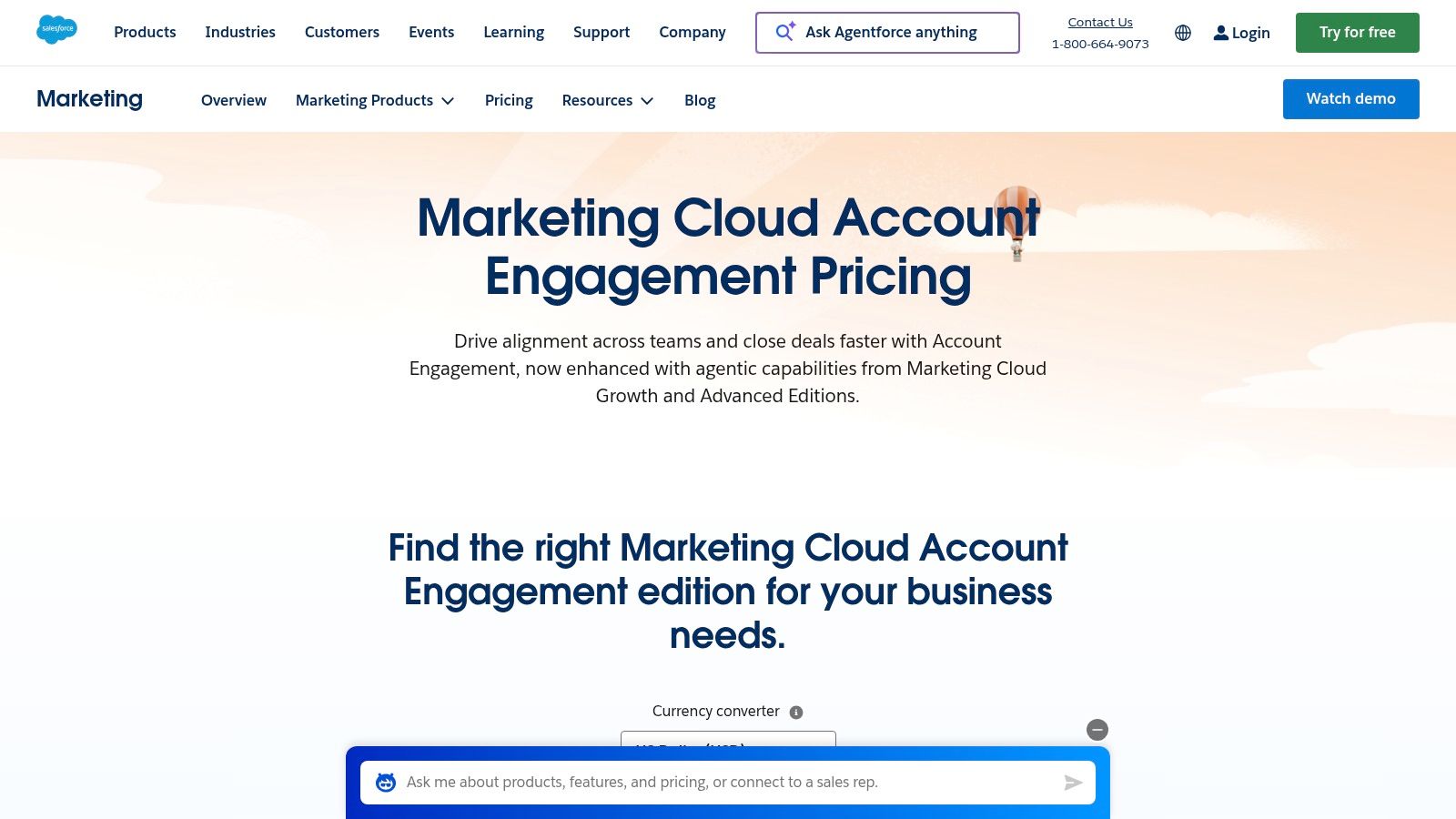
The platform's sophisticated lead scoring and grading models allow marketers to prioritize the most sales-ready leads. With its powerful B2B marketing analytics, you can track campaign influence and calculate ROI directly within the Salesforce environment. This deep data connection makes it one of the best marketing automation software solutions for businesses that need to prove marketing's direct impact on sales.
Key Features & Considerations
- Native Salesforce Sync: Unbeatable, real-time synchronization with Salesforce leads, contacts, and campaigns.
- Lead Nurturing & Scoring: Advanced tools to score leads on engagement and grade them on profile data.
- B2B Analytics: Robust ROI and lifecycle reporting capabilities that connect marketing activities directly to sales pipeline.
- Pricing & Commitment: The platform is a significant investment, making it best suited for mid-market and enterprise companies already using Salesforce.
Website: https://www.salesforce.com/products/marketing-cloud/pricing/b2b-marketing-automation/
Adobe Marketo Engage: The Enterprise B2B Specialist
Adobe Marketo Engage is the go-to solution for large B2B organizations with complex sales cycles. Its core strength is its ability to handle immense scale and intricate logic, making it a favorite for teams focused on account-based marketing (ABM). Where other platforms simplify, Marketo provides granular control over the customer journey, from lead scoring to multi-touch revenue attribution.
The platform is designed for deep integration with CRMs like Salesforce, creating a powerful sync that aligns sales and marketing. It excels at omnichannel campaign orchestration across email, web, ads, and events. This robust feature set solidifies Marketo’s place as one of the best marketing automation software platforms for companies that need powerful analytics and mature ABM capabilities. Exploring different marketing automation workflows can provide valuable insights into its advanced capabilities.
Key Features & Considerations
- Advanced Lead Management: Utilize sophisticated lead and account scoring, routing, and lifecycle models.
- Account-Based Marketing (ABM): Native tools for identifying target accounts and engaging them with personalized content.
- Complexity & Learning Curve: The platform's power comes with a significant learning curve; it requires skilled users to maximize its potential.
- Pricing & Implementation: Access is quote-based and tailored to enterprise needs, often involving a considerable investment.
Website: https://business.adobe.com/products/marketo/marketo-engage.html
Salesforce Marketing Cloud
Salesforce Marketing Cloud is the enterprise-grade solution for businesses already embedded in the Salesforce ecosystem. Its primary strength is its native integration with the Salesforce CRM, creating a unified data platform for complex, multi-channel campaigns. This connection allows marketers to leverage deep customer insights, making it a go-to for large organizations that demand scalability and a single view of the customer.
The platform’s Journey Builder tool enables marketers to design personalized customer paths across email, SMS, push notifications, and advertising. While powerful, its complexity means it is one of the best marketing automation software options specifically for enterprise teams with dedicated resources. Understanding how to measure marketing campaign success is critical, and Salesforce provides advanced analytics to track performance.
Key Features & Considerations
- Deep Salesforce CRM Integration: Natively syncs with Sales Cloud and Service Cloud for a unified view of every customer interaction.
- Multi-Channel Orchestration: Use Journey Builder to create automated campaigns across email, SMS, social media advertising, and mobile push notifications.
- Complex Pricing & Add-ons: The platform is sold in tiered editions with many essential features sold as separate, costly add-ons.
- Implementation & Usability: Expect a significant implementation process and a steeper learning curve. It is built for specialists, not generalists.
Website: https://www.salesforce.com/marketing/pricing/
Iterable: The Enterprise Cross-Channel Engagement Platform
Iterable is built for high-growth companies that need to deliver harmonized, personalized customer experiences across multiple channels. Its core strength lies in activating behavioral data in real time, allowing marketers to orchestrate complex journeys across email, SMS, push notifications, and in-app messages. This makes it ideal for B2C brands in mobile-first industries like e-commerce, media, and travel.

The platform’s Workflow Studio is a powerful canvas for designing these multi-channel campaigns. Unlike many competitors, Iterable provides robust experimentation and AI-powered optimization tools natively. This focus on developer-friendly APIs makes it one of the best marketing automation software choices for businesses with technical teams that want to build a deeply integrated customer engagement engine.
Key Features & Considerations
- True Cross-Channel Orchestration: Seamlessly manage and sequence messages across email, mobile push, SMS, and in-app notifications.
- Real-Time Data Activation: Utilizes a flexible data model for immediate personalization based on the latest user behaviors.
- Technical Implementation: Getting the most out of Iterable often requires developer resources for API integrations and data setup.
- Pricing Model: Pricing is quote-based and tailored to enterprise needs, resulting in a significant total cost of ownership.
Website: https://iterable.com
3. How to choose automation software for SMBs and growing businesses?
Small and mid-sized businesses need powerful, accessible automation that can scale without breaking the bank.
ActiveCampaign: Powerful Automation for Growing Businesses
ActiveCampaign offers enterprise-level automation at a price point accessible to small and mid-sized businesses. Its core strength is a highly flexible and powerful visual workflow builder. This makes it an ideal choice for businesses that have outgrown simpler email marketing tools and need deeper control over the customer journey.
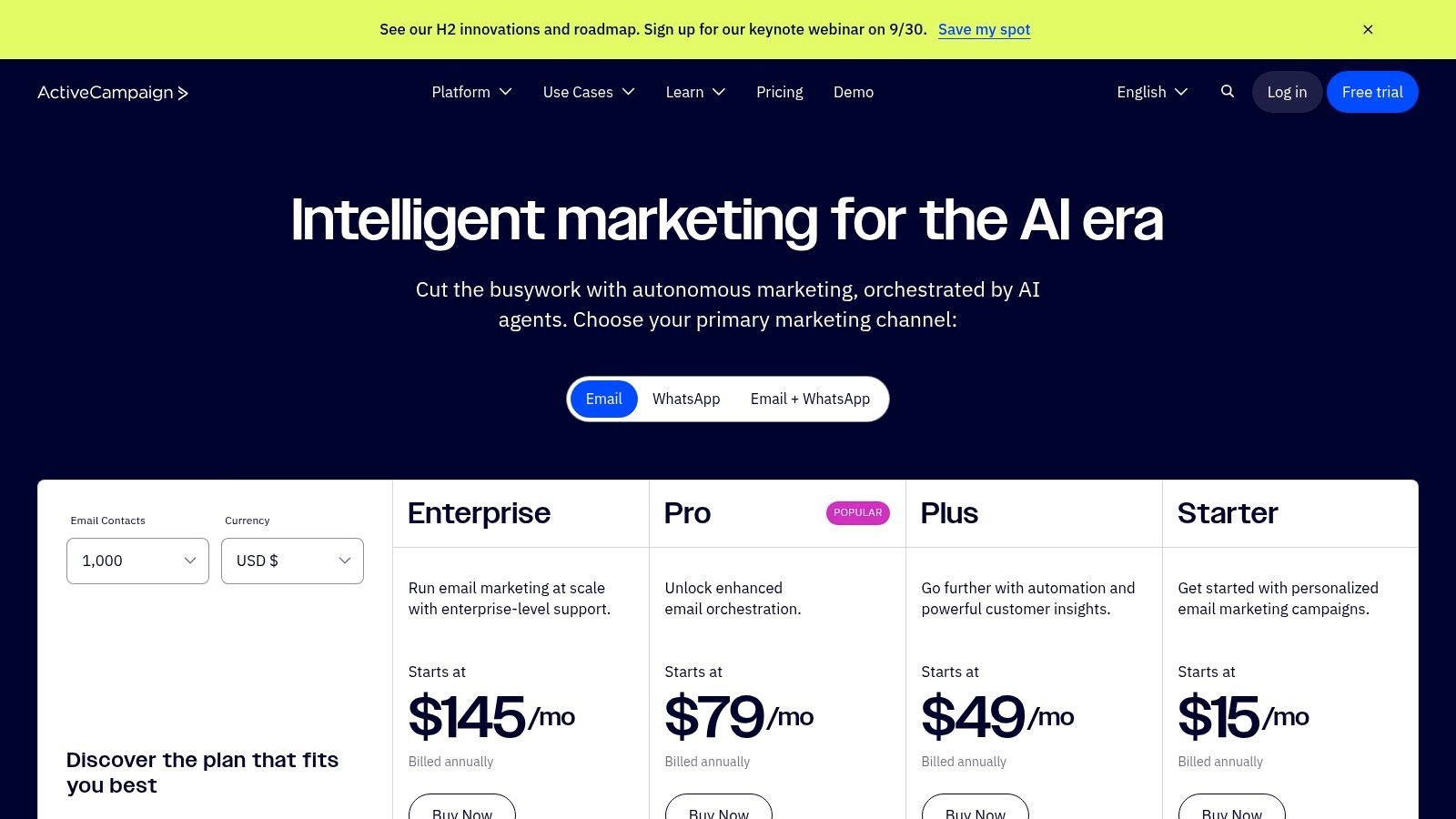
The platform integrates a solid CRM and sales automation features directly into its workflows. You can trigger automations based on deal stages, website visits, or email engagement. ActiveCampaign’s extensive integration library ensures it can act as the central hub for your entire martech stack. This robust feature set makes it one of the best marketing automation software options for businesses scaling their customer lifecycle management.
Key Features & Considerations
- Visual Automation Builder: Supports complex, multi-channel workflows with branching logic and split testing.
- Built-in CRM: Combines marketing automation with sales pipelines and lead scoring. Learn more about marketing automation for small businesses.
- Site & Event Tracking: Track on-site visitor behavior to trigger highly personalized automations.
- Pricing Tiers: Access to features like predictive sending and advanced reporting is gated behind higher-tier plans.
Website: https://www.activecampaign.com/pricing
Mailchimp (by Intuit)
Mailchimp has evolved from an email marketing tool into a broader automation platform, especially for small to medium-sized businesses. It stands out by making sophisticated automation accessible, wrapping powerful features in a famously user-friendly interface. Its capabilities now extend to creating websites, landing pages, digital ads, and social posts.
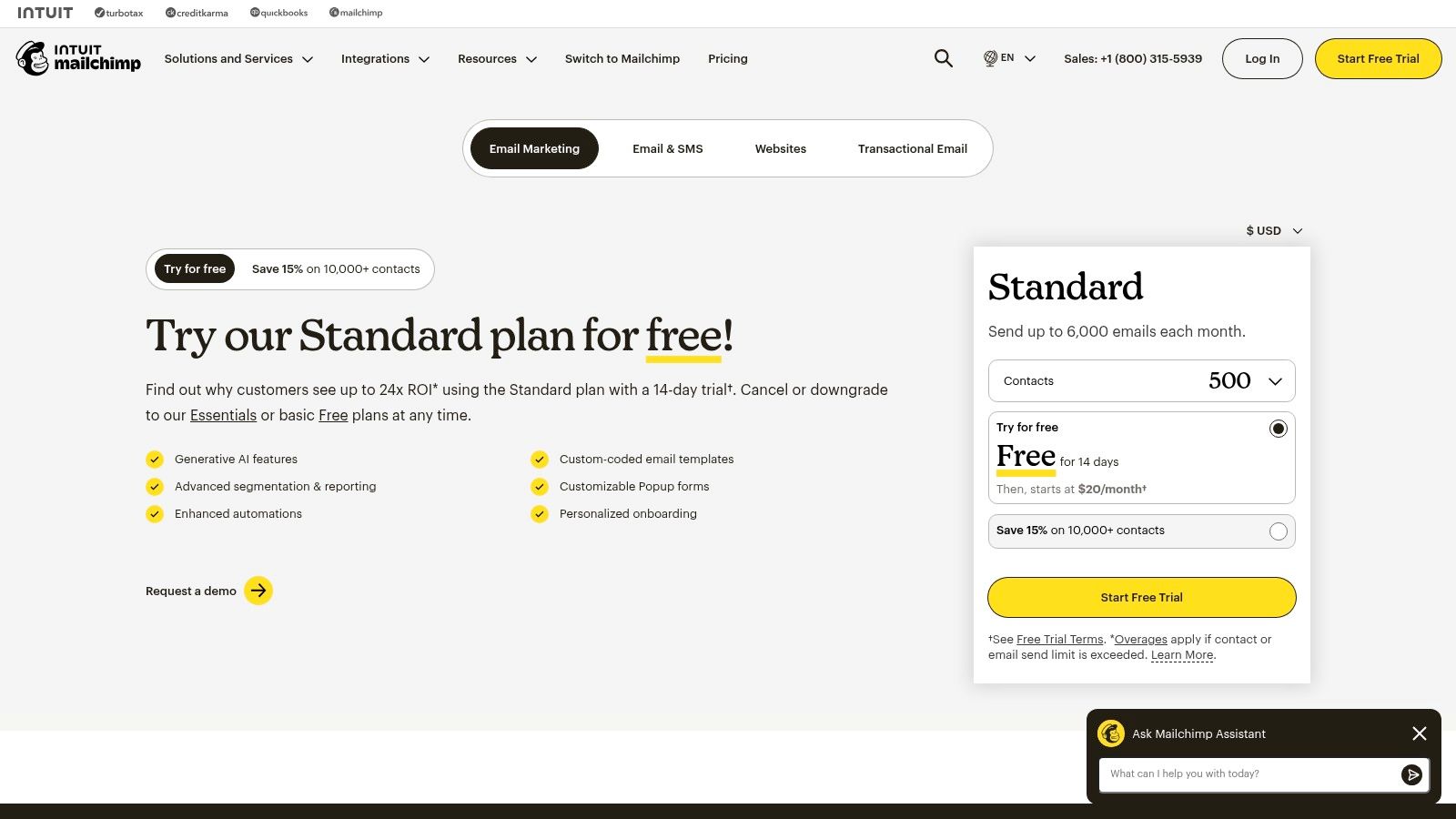
The platform excels with its pre-built customer journeys, which provide SMBs with proven templates for welcome series, abandoned cart reminders, and re-engagement campaigns. This templated approach significantly lowers the barrier to entry. For businesses looking for an easy-to-use solution with strong email deliverability, Mailchimp is one of the best marketing automation software options to start and grow with.
Key Features & Considerations
- Pre-built Customer Journeys: A library of ready-to-use automation templates simplifies setting up effective workflows.
- Creative Assistant: AI-powered tools help generate on-brand designs for emails, social posts, and other assets.
- Pricing Structure: Pricing is primarily based on contact count. While it starts affordably, costs can escalate as your audience grows.
- Ecommerce Integrations: Excellent integrations with platforms like Shopify and WooCommerce enable powerful, behavior-driven automations.
Website: https://mailchimp.com/pricing/
4. What is the best automation software for ecommerce?
Ecommerce businesses require specialized automation that integrates deeply with their online stores to drive sales and increase customer lifetime value.
Klaviyo: The Ecommerce Revenue Engine
Klaviyo is the go-to marketing automation platform for direct-to-consumer and ecommerce brands. Its strength is its deep, native integrations with platforms like Shopify and BigCommerce, allowing it to pull in rich customer data. It's an engine designed to leverage purchase history and browsing behavior to drive sales, enabling hyper-personalized marketing that directly impacts the bottom line.

The platform shines with its pre-built automation flows for abandoned carts, browse abandonment, and post-purchase follow-ups. By combining email and SMS within a single workflow, Klaviyo allows brands to create cohesive, multi-channel campaigns. This focus on commerce-specific functionality makes it one of the best marketing automation software choices for businesses whose primary goal is increasing online revenue.
Key Features & Considerations
- Deep Ecommerce Integrations: Connects with over 350 ecommerce and marketing tools to unify customer data.
- Revenue-Focused Automation: Pre-built flows are designed to recover lost sales and encourage repeat purchases.
- Multi-Channel Communication: Combine email, SMS, and now WhatsApp within a single platform to reach customers where they are most active.
- Pricing & Add-ons: Pricing is based on email and SMS profile counts. Advanced features like a dedicated CDP come as paid add-ons.
Website: https://www.klaviyo.com/pricing
Omnisend: The Ecommerce Automation Specialist
Omnisend focuses squarely on the needs of ecommerce businesses. It provides a laser-focused toolset designed to increase sales for online stores on platforms like Shopify and BigCommerce. Its primary differentiator is the deep integration of email, SMS, and web push notifications into pre-built workflows that target specific ecommerce triggers.

The platform is engineered to help online retailers get sophisticated automations running quickly. You can launch a welcome series or a customer win-back campaign in minutes using professional templates. Omnisend excels at creating a unified customer experience by adding SMS messages or push notifications directly into email automation sequences. This makes it one of the best marketing automation software solutions for retailers wanting to maximize engagement.
Key Features & Considerations
- Ecommerce-Centric Workflows: A library of pre-built automations for abandoned carts, product abandonment, cross-selling, and more.
- Integrated SMS & Push: Seamlessly combine email, SMS, and web push notifications within a single automation flow.
- Pricing & Value: Offers a free plan for getting started and competitive pricing on paid tiers, with Pro plans including unlimited email sends.
- Use Case Specificity: While powerful for ecommerce, its features are less suited for B2B, SaaS, or other non-retail business models.
Website: https://www.omnisend.com/pricing/
5. Which marketing automation platforms are best for tech and product-led companies?
Tech companies, especially SaaS and product-led businesses, need automation driven by in-app events and API calls.
Customer.io: The Developer-Friendly Messaging Platform
Customer.io focuses on data-driven, event-based messaging ideal for product-led and SaaS companies. Its key strength is its flexible data model, which allows marketers to trigger campaigns from user behavior and complex API calls. This makes it perfect for sending contextual messages like trial expiration reminders or feature adoption nudges.

The platform supports email, SMS, push notifications, and in-app messages, all managed through a visual workflow builder. Its robust developer tools and API-first approach empower technical teams to integrate the tool deeply into their product ecosystem. For companies that need to send messages based on real-time user activity, Customer.io is one of the best marketing automation software choices available.
Key Features & Considerations
- API-Triggered Messaging: Automate communications based on any event or data point sent from your application.
- Flexible Data Model: Supports complex data structures, allowing you to build campaigns around "objects" in addition to user profiles.
- Multi-Channel Workflows: Visually build cohesive customer journeys across email, SMS, push, and in-app messages.
- Developer-Centric: Provides extensive documentation, SDKs, and a powerful API, making it a favorite among engineering teams.
Website: https://customer.io/pricing/
6. Where can you compare automation software with user reviews?
Before making a final decision, it's wise to consult third-party review sites for unbiased feedback from real users.
G2 and Capterra (Category/Comparison Sites)
While not a single software, G2 and Capterra are indispensable resources for anyone in the market for marketing automation. These leading software marketplaces offer comprehensive platforms to compare dozens of tools side-by-side. Their strength is in aggregating thousands of verified user reviews, providing a real-world perspective on a platform's strengths and weaknesses.
These sites are essential starting points for finding the best marketing automation software tailored to your needs. You can filter options by company size, industry, and specific features, quickly narrowing a vast market to a manageable shortlist. For anyone conducting due diligence, spending time on G2 or Capterra is a critical step to avoid a costly purchasing mistake.
Key Features & Considerations
- Verified User Reviews: Access thousands of in-depth reviews from real users, detailing their experiences.
- Comparison Engine: Use powerful filtering and side-by-side comparison charts to evaluate tools.
- Vendor Visibility: Be aware that sponsored placements and vendor advertising can influence which platforms are featured more prominently.
- Free Access: These resources are completely free for buyers to use, providing immense value without any investment.
Website: https://www.g2.com/categories/marketing-automation
How to Make Your Final Decision on Marketing Automation Software
Navigating the landscape of marketing automation can feel overwhelming, but this exploration of the top platforms should make your path clearer. The central takeaway is this: the best marketing automation software is not a one-size-fits-all solution.
So, what is the best choice for you? The ideal platform depends entirely on your unique context. An ecommerce brand will find Klaviyo’s deep integration invaluable, while a B2B company will benefit from the CRM alignment offered by a tool like Pardot.
Key Factors to Guide Your Choice
As you move from this guide to your evaluation, keep these critical factors in mind. Don't just look at features; consider the holistic impact on your operations.
- Business Model and Goals: Are you B2B, B2C, or e-commerce? Your goal dictates the features you need. A B2B focus requires robust lead nurturing, while an e-commerce business needs advanced segmentation and abandoned cart recovery.
- Team Size and Technical Skill: Be honest about your team's capacity. Platforms like Marketo offer incredible power but demand a significant investment in training. In contrast, tools like Mailchimp are known for user-friendly interfaces, allowing smaller teams to get running quickly.
- Scalability and Future Growth: Where do you see your business in three to five years? Choosing a platform that can grow with you is essential. Consider tiered pricing and the availability of advanced features you may need later.
- Integration Ecosystem: Your marketing automation software must connect seamlessly with your CRM, e-commerce platform, and other essential software. Before committing, verify that the platform supports the critical integrations your workflow depends on. To explore applications beyond general business use, you might consider reading about how marketing automation is specifically leveraged by agencies.
Your Actionable Next Steps
Information is only powerful when you act on it. Use this analysis to build a shortlist of two to three platforms that seem like the best fit. Then, what's next?
- Request Personalized Demos: Schedule live demos with your shortlisted vendors. Prepare a list of questions and use cases relevant to your business to see exactly how the software would solve your unique challenges.
- Sign Up for Free Trials: Nothing beats a test drive. Take advantage of free trials to explore the user interface, build a test campaign, and import a small segment of your contacts. This real-world usage will reveal more than any feature list.
- Calculate the True ROI: Look beyond the monthly fee. Factor in implementation costs, training time, and the potential revenue lift from improved efficiency and more effective campaigns.
Ultimately, choosing the best marketing automation software is a strategic decision that will shape your marketing for years to come. By carefully evaluating your needs against the capabilities of these leading platforms, you can confidently select a partner that will empower you to build stronger customer relationships and drive sustainable growth. The right tool is out there, and now you have the map to find it.
Now that you've selected the perfect automation tool, are you ready to maximize its ROI? The best automation won't matter if your landing pages don't convert. LanderMagic helps you create stunning, high-performance landing pages in minutes, ensuring every click has the best possible chance of becoming a conversion. See how LanderMagic can supercharge your post-click strategy and complete your marketing stack.



